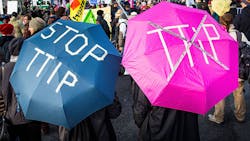EU Needs 'More Leadership' on US Free Trade Deal: Commissioner
The European Union's top trade official on Monday said member states need to show more leadership in persuading citizens about the benefits of a massive and controversial free trade agreement with the United States.
"Some (EU members) should engage much more to convince (citizens) why they think this is good for their country and for Europe, so I would ask for more leadership," EU Trade Commissioner Cecilia Malmstroem said in Riga, Latvia, which currently holds the EU's rotating presidency.
Talks on the mammoth agreement will resume in July, she said.
Hundreds of demonstrations were held in April, mainly in Europe, against the Transatlantic Trade and Investment Partnership (TTIP).
In Germany, Europe's largest economy, 43% of people think the US-EU trade deal would be "bad" for their country, according to a recent survey.
Sticking points include mechanisms to resolve disputes with foreign investors and rules on genetically modified imports.
The EU wants to set up an investment court to allay concerns among Europeans that the arbitration panel foreseen in the deal would effectively allow companies to bypass national courts if they feel their investments are under threat.
The U.S. has meanwhile criticized an EU plan to allow member states to block genetically modified imports.
"When it comes to GMOs or hormones in beef we're not even discussing it, it's not even on the table, but we're confident this agreement will lead to increased jobs, investment and trade," Malmstroem said of the deal.
It could be signed "under the Obama administration," she said, but ruled out negotiations would be completed this year. U.S. President Barack Obama's term ends in late 2016.
Malmstroem said she would also talk with her American counterpart on Tuesday "for a couple of hours to take stock" on the sidelines of a conference in Berlin.
If concluded, TTIP would be the world's biggest trade deal, linking about 60% of the globe's economic output in a colossal market of 850 million consumers, creating a free-trade corridor from Hawaii to Lithuania.
Copyright Agence France-Presse, 2015
About the Author
Agence France-Presse
Copyright Agence France-Presse, 2002-2025. AFP text, photos, graphics and logos shall not be reproduced, published, broadcast, rewritten for broadcast or publication or redistributed directly or indirectly in any medium. AFP shall not be held liable for any delays, inaccuracies, errors or omissions in any AFP content, or for any actions taken in consequence.
